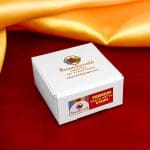No products in the cart.
Shri Mangal Chandika Stotram: Invoking the Auspicious Blessings of Devi Mangalachandika
| Sanskrit/Hindi | Translation | Meaning |
ध्यान |
||
| ॐ ह्रीं श्रीं क्लीं सर्वपूज्ये देवी मङ्गलचण्डिके I ऐं क्रूं फट् स्वाहेत्येवं चाप्येकविन्शाक्षरो मनुः II |
Om Hreem Shreem Kleem Sarvapoojye Devi Mangalachandike I Aim Kroom Phat Swahaityevam Chapyekavinshaksharo Manuh II |
I worship the highly revered Devi Mangalachandika, the embodiment of the divine feminine energy, with the mantra ‘Om Hreem Shreem Kleem Sarvapoojye Devi Mangalachandike. May this twenty-one-syllable mantra grant blessings and fulfillment of all desires. |
| पूज्यः कल्पतरुश्चैव भक्तानां सर्वकामदः I दशलक्षजपेनैव मन्त्रसिद्धिर्भवेन्नृणाम् II |
Poojyah Kalpatarushchaiva Bhaktanam Sarvakamadah I Dashalakshajapenaiva Mantrasiddhirbhavennrinam II |
She is the revered Kalpataru (wish-fulfilling tree) and fulfills the desires of her devotees. The repetition of the ten million times of this mantra leads to its attainment and success for individuals. |
| मन्त्रसिद्धिर्भवेद् यस्य स विष्णुः सर्वकामदः I ध्यानं च श्रूयतां ब्रह्मन् वेदोक्तं सर्व सम्मतम् II |
Mantrasiddhirbhaved yasya sa Vishnuh Sarvakamadah I Dhyanam cha shruyatam Brahman Vedoktam Sarva Sammatam II |
Whosever achieves the accomplishment of this mantra, they attain the blessings of Lord Vishnu, who grants all desires. Let this meditation be heard, which is in agreement with the Vedas and widely accepted. |
| देवीं षोडशवर्षीयां शश्वत्सुस्थिरयौवनाम् I सर्वरूपगुणाढ्यां च कोमलाङ्गीं मनोहराम् II |
Devim Shodashavarshiyam Shashwatsusthirayuvanam I Sarvaroopagunadhyam cha Komalangim Manoharam II |
She is the eternal and stable youthful goddess, adorned with all forms and virtues, with delicate limbs and captivating beauty. |
| श्वेतचम्पकवर्णाभां चन्द्रकोटिसमप्रभाम् I वन्हिशुद्धांशुकाधानां रत्नभूषणभूषिताम् II |
Shwetachampakavarnabhaham Chandrakotisamaprabham I Vanishuddhanshukadhanam Ratnabhushanabhushitam II |
With the complexion of white champaka flowers, radiating brilliance like millions of moons, adorned with a pure and bright cloth, and adorned with gemstone ornaments. |
| बिभ्रतीं कबरीभारं मल्लिकामाल्यभूषितम् I बिम्बोष्टिं सुदतीं शुद्धां शरत्पद्मनिभाननाम् II |
Bibhratim Kabaribharam Mallikamalyabhushitam I Bimboshtim Sudatim Shuddham Sharatpadmanibhananam II |
Carrying a tuft of hair, wearing a garland of jasmine flowers, with lustrous and pure red lips, and a face resembling the autumn lotus. |
| ईषद्धास्यप्रसन्नास्यां सुनीलोल्पललोचनाम् I जगद्धात्रीं च दात्रीं च सर्वेभ्यः सर्वसंपदाम् II |
Ishaddhasyaprasannasyam Sunilolpalalochanam I Jagadhatrim cha Datrim cha Sarvebhyah Sarvasampadam II |
With serene and pleasing appearance, with blue lotus-like eyes, she is the sustainer of the universe and the giver of gifts, bestowing prosperity upon all. |
| संसारसागरे घोरे पोतरुपां वरां भजे II | Sansarasagare ghore Potarupam Varam Bhaje II | I worship the supreme Devi, who is the boat to cross the dreadful ocean of worldly existence and the bestower of boons. |
| देव्याश्च ध्यानमित्येवं स्तवनं श्रूयतां मुने I प्रयतः संकटग्रस्तो येन तुष्टाव शंकरः II |
Devyashcha Dhyana-mityevam Stavanam Shruyatam Mune I Prayatah Sankatagrashto Yena Tushtava Shankarah II |
O sage, this is the meditation and hymn to be recited. Lord Shankara became pleased when praised by the one who was deeply afflicted by difficulties. |
|| शंकर उवाच || |
||
| रक्ष रक्ष जगन्मातर्देवि मङ्गलचण्डिके I हारिके विपदां राशेर्हर्षमङ्गलकारिके II |
Raksha Raksha Jagatamata Devi Mangalachandike I Harike Vipadām Rāsher Harshamangalakārike II |
protect, O Mother of the Universe, Devi Mangalachandike,
O Hari, the remover of obstacles and bestower of auspiciousness. |
| हर्षमङ्गलदक्षे च हर्षमङ्गलचण्डिके I शुभे मङ्गलदक्षे च शुभमङ्गलचण्डिके II |
Harshamangaladakṣhe cha Harshamangalachandike I Shubhe Mangaladakṣhe cha Shubhamangalachandike II |
“Harshamangaladakshi” refers to the goddess who bestows happiness and auspiciousness. “Harshamangalachandike” emphasizes her role as the source of joy and the promoter of auspiciousness. “Shubhamangaladakshi” signifies the goddess who grants good fortune and auspiciousness. “Shubhamangalachandike” denotes her as the bringer of prosperity and auspiciousness. |
| मङ्गले मङ्गलार्हे च सर्व मङ्गलमङ्गले I सतां मन्गलदे देवि सर्वेषां मन्गलालये II |
Mangale Mangalarhe cha Sarva Mangalamangale I Satām Mangalade Devi Sarveshām Mangalālaye II |
O Mangale, the embodiment of all auspiciousness,
O Devi, the bestower of auspiciousness for the virtuous, the abode of all auspiciousness. |
| पूज्या मङ्गलवारे च मङ्गलाभीष्टदैवते I पूज्ये मङ्गलभूपस्य मनुवंशस्य संततम् II |
Poojya Mangalavāre cha Mangalābhīṣhṭadaivate I Poojye Mangalabhūpasya Manuvamśasya Santatam II |
On the revered day of Mangalavara, the deity of auspiciousness, I worship Mangalabhupa, the eternal ruler of the Manu dynasty. |
| मङ्गलाधिष्टातृदेवि मङ्गलानां च मङ्गले I संसार मङ्गलाधारे मोक्षमङ्गलदायिनि II |
Mangalādhiṣhṭātri Devi Mangalānām cha Mangale I Samsāra Mangalādhāre Mokṣhamangaladāyini II |
O Devi, the presiding deity of auspiciousness, the auspiciousness among all auspiciousness,
The supporter of worldly auspiciousness, the bestower of liberation. |
| सारे च मङ्गलाधारे पारे च सर्वकर्मणाम् I प्रतिमङ्गलवारे च पूज्ये च मङ्गलप्रदे II |
Sāre cha Mangalādhāre Pāre cha Sarvakarmaṇām I Pratimangalavāre cha Poojye cha Mangalaprade II |
In every aspect of life, in every endeavor,
On the revered day of Pratimangala, and in worship, you grant auspiciousness. |
| स्तोत्रेणानेन शम्भुश्च स्तुत्वा मङ्गलचण्डिकाम् I प्रतिमङ्गलवारे च पूजां कृत्वा गतः शिवः II |
Stotreṇānena Śhambhushcha Stutvā Mangalachandikām I Pratimangalavāre cha Poojām Kṛitvā Gatah Shiva II |
By reciting this hymn, Lord Shiva praised Mangalachandika,
Having performed worship on the day of Pratimangala, Lord Shiva was pleased. |
| देव्याश्च मङ्गलस्तोत्रं यः श्रुणोति समाहितः I तन्मङ्गलं भवेच्छश्वन्न भवेत् तदमङ्गलम् II |
Devyashcha Mangalastotram Yah śhruṇoti Samāhitah I Tanmangalam Bhavet shashvat na Bhavet Tadamanagalam II |
Whoever attentively listens to the Mangalastotram of Devi,
That person attains perpetual auspiciousness, never experiencing inauspiciousness. |
Benefits of Shri Mangal Chandika Stotram:
Blessings: By chanting Shri Mangal Chandika Stotram, one can invoke the auspicious blessings of Devi Mangalachandika. It is believe to attract positive energy, remove obstacles, and bring overall well-being and prosperity into one’s life.
Removal of Negativity: The stotram is known for its ability to dispel negative influences, including negative thoughts, energies, and obstacles. It can help purify the mind and create a protective shield against negative forces.
Enhancing Spiritual Growth: Reciting the Shri Mangal Chandika Stotram regularly can deepen one’s spiritual connection with the divine. It aids in spiritual growth, fostering devotion, and cultivating a sense of inner peace and harmony.
Fulfillment of Desires: Devi Mangalachandika is regarded as the fulfiller of desires. The stotram is believed to help in manifesting one’s wishes and aspirations, be it related to personal, professional, or spiritual goals.
Promoting Overall Well-being: The vibrations and chanting of the stotram can have a positive impact on emotional well-being. It is believed to bring harmony, balance, and positive transformation in various aspects of life.




